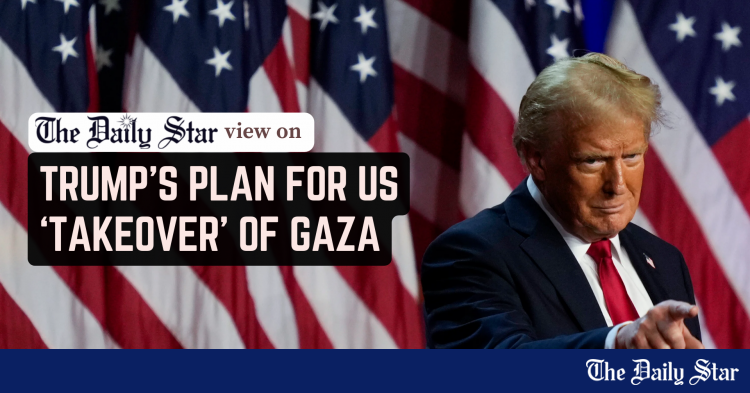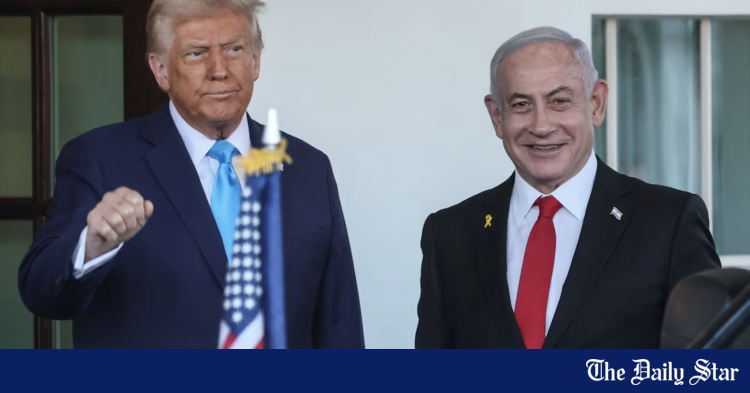- Copy to clipboard
- Thread starter
- #526

Gaza belongs to its people
US "taking over" Gaza is an outrageous idea

VISUAL: STAR
The US may no longer be the beacon of hope it once was, but there are still things expected from the country as a global power. Chief among them is a responsibility to uphold basic human rights and international law. This expectation has been tested time and again, but rarely as starkly as it is now, with Donald Trump's alarming plan for Gaza. On Tuesday evening, at a joint news conference alongside Israeli Prime Minister Benjamin Netanyahu, the US president proposed "long-term ownership" of Gaza by the United States. This came after he repeatedly called in recent days for the war-ravaged territory's 1.2 million residents to be resettled. While officials later tried to walk back the takeover proposal amid fierce criticism, saying any displacement of Gazans would be temporary, Trump on Thursday restated his vision, suggesting his determination to go ahead with it.
For decades, US foreign policy—despite its inconsistencies—has at least paid lip service to a two-state solution for the peaceful coexistence of Israel and Palestine. Trump's approach obliterates that pretence. If implemented, it would not only mean "ethnic cleansing" in Gaza—as the UN chief has rightly called it—but also set an extremely dangerous precedent where stronger powers might feel emboldened to resolve territorial disputes through mass expulsions.
This should send shivers down the spine of anyone who values justice and human rights. For decades, US foreign policy—despite its inconsistencies—has at least paid lip service to a two-state solution for the peaceful coexistence of Israel and Palestine. Trump's approach obliterates that pretence. If implemented, it would not only mean "ethnic cleansing" in Gaza—as the UN chief has rightly called it—but also set an extremely dangerous precedent where stronger powers might feel emboldened to resolve territorial disputes through mass expulsions. It is also deeply insulting for the Gazans after the genocide and devastation they endured at the hands of Israel over the last 15 months. Suggesting that those still alive should be uprooted, cast aside, and scattered across unwilling nations is outrageous, to say the least.
Naturally, Palestinians and Arab states where Trump and Netanyahu want Gazans to be resettled have rejected the proposal. Similarly, the world must also stand firm against this effort to make the suffering of Gazans permanent by robbing them of their homeland. Reportedly, emboldened by Trump, Israel has already instructed its military to formulate a plan for their "voluntary" departures. In other words, a permanent displacement may already be in motion even though they have only recently begun to return to the rubble they once called home following a ceasefire deal between Israel and Hamas. All nations must come forward to prevent this modern-day holocaust.
US "taking over" Gaza is an outrageous idea
VISUAL: STAR
The US may no longer be the beacon of hope it once was, but there are still things expected from the country as a global power. Chief among them is a responsibility to uphold basic human rights and international law. This expectation has been tested time and again, but rarely as starkly as it is now, with Donald Trump's alarming plan for Gaza. On Tuesday evening, at a joint news conference alongside Israeli Prime Minister Benjamin Netanyahu, the US president proposed "long-term ownership" of Gaza by the United States. This came after he repeatedly called in recent days for the war-ravaged territory's 1.2 million residents to be resettled. While officials later tried to walk back the takeover proposal amid fierce criticism, saying any displacement of Gazans would be temporary, Trump on Thursday restated his vision, suggesting his determination to go ahead with it.
For decades, US foreign policy—despite its inconsistencies—has at least paid lip service to a two-state solution for the peaceful coexistence of Israel and Palestine. Trump's approach obliterates that pretence. If implemented, it would not only mean "ethnic cleansing" in Gaza—as the UN chief has rightly called it—but also set an extremely dangerous precedent where stronger powers might feel emboldened to resolve territorial disputes through mass expulsions.
This should send shivers down the spine of anyone who values justice and human rights. For decades, US foreign policy—despite its inconsistencies—has at least paid lip service to a two-state solution for the peaceful coexistence of Israel and Palestine. Trump's approach obliterates that pretence. If implemented, it would not only mean "ethnic cleansing" in Gaza—as the UN chief has rightly called it—but also set an extremely dangerous precedent where stronger powers might feel emboldened to resolve territorial disputes through mass expulsions. It is also deeply insulting for the Gazans after the genocide and devastation they endured at the hands of Israel over the last 15 months. Suggesting that those still alive should be uprooted, cast aside, and scattered across unwilling nations is outrageous, to say the least.
Naturally, Palestinians and Arab states where Trump and Netanyahu want Gazans to be resettled have rejected the proposal. Similarly, the world must also stand firm against this effort to make the suffering of Gazans permanent by robbing them of their homeland. Reportedly, emboldened by Trump, Israel has already instructed its military to formulate a plan for their "voluntary" departures. In other words, a permanent displacement may already be in motion even though they have only recently begun to return to the rubble they once called home following a ceasefire deal between Israel and Hamas. All nations must come forward to prevent this modern-day holocaust.







